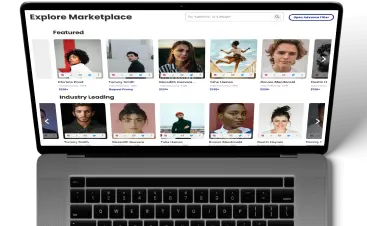In 2024, influencer marketing isn’t just a trend; it’s a powerful force reshaping how brands connect with audiences. According to The State of Influencer Marketing Benchmark Report 2024, the influencer marketing industry is set to grow to approximately $24 billion by the end of 2024. Influencer management plays a huge role in ensuring your money yields major results for your brand.
Did you know that over 80% of consumers have purchased a product after seeing it recommended by an influencer? This staggering statistic showcases the undeniable impact influencers have on consumer behavior. As social media evolves, so does the art of managing these influential voices.
Whether you’re a seasoned marketer or just dipping your toes into the influencer world, mastering the art of influencer management is the thing to do right now. This guide will explore everything from the basics of influencer management to actionable tips to help you build stronger, more effective partnerships with influencers in 2024.
What is Influencer Management?
Influencer management encompasses identifying, engaging, and managing relationships with influencers who can effectively promote your brand’s products or services. Influencer management involves:
- Identifying the Right Influencers includes researching and selecting influencers who align with your brand’s values and audience. It’s not just about follower count but engagement rates, audience demographics, and the influencer’s relevance to your niche.
- Managing Relationships: Once influencers are onboard, managing the relationship becomes paramount. This includes setting expectations, maintaining open lines of communication, and ensuring that the collaboration remains mutually beneficial.
- Campaign Oversight: Overseeing the entire campaign, from content creation to post-campaign analysis to achieving the objectives.
- Measuring Success: Tracking the performance of influencer campaigns using various metrics such as engagement rates, impressions, click-through rates, and conversions to assess ROI.
Effective influencer management ensures that both the brand and the influencer meet their goals, fostering long-term partnerships beyond a single campaign.
Who is an Influencer Marketing Manager?
An Influencer Marketing Manager is the linchpin in any influencer marketing strategy. They are responsible for planning, executing, and managing influencer campaigns. The role of an Influencer Marketing Manager includes:
- Strategy Development: They craft a comprehensive influencer marketing strategy that aligns with the brand’s overall marketing objectives. This strategy includes identifying target influencers, setting campaign goals, and determining the budget.
- Relationship Building: The manager builds and nurtures relationships with influencers. This involves understanding each influencer’s strengths and ensuring they are well-aligned with the brand’s goals.
- Campaign Execution: They oversee the entire influencer campaign, ensuring that all deliverables are met on time and that the content produced aligns with the brand’s messaging.
- Performance Analysis: After the campaign, the Influencer Marketing Manager analyzes its performance, looking at metrics like engagement, reach, and ROI. This analysis helps refine future campaigns and optimize strategies.
- Negotiation and Contract Management: The manager handles negotiations with influencers regarding compensation, content deliverables, and usage rights. They ensure that all agreements are clearly outlined in contracts to provide clarity.
- Trend Monitoring: Stay updated on the latest trends in influencer marketing. This includes changes in social media algorithms, emerging platforms, and shifting audience behaviors.
The role is multifaceted and requires a combination of marketing expertise, people skills, and data analysis. An effective Influencer Marketing Manager can turn influencers into powerful brand advocates who drive long-term growth.
Tips for Successful Influencer Management
1. Identify the Right Influencers
The foundation of a successful influencer campaign lies in selecting the right influencers. Here’s how you can do it:
- Define Your Target Audience: Start by understanding your target audience. Look at demographics such as age, gender, location, and interests. This will help you find influencers whose followers match your target market.
- Use Data-Driven Tools: Tools like Affise, Traackr, or BuzzSumo can help you identify influencers with significant followings and high engagement rates. Remember, a smaller audience with higher engagement often yields better results than a large, disengaged following.
- Analyze Past Collaborations: Review the influencer’s previous collaborations to see if they’ve worked with brands similar to yours and how successful those campaigns were. This can give you insight into how they might perform for your brand.
- Engagement over Follower Count: Don’t be swayed by large follower numbers. Instead, focus on engagement rates. An influencer with 10,000 highly engaged followers can be more valuable than one with 100,000 who don’t interact with the content.
2. Build Authentic Relationships
In 2024, authenticity is key. Influencers and their audiences can quickly spot inauthentic partnerships, harming your brand and the influencer’s reputation. To build authentic relationships:
- Start with Mutual Respect: Treat influencers as partners rather than just a means to an end. Show genuine interest in their content and respect their creative process.
- Engage Before You Pitch: Follow and engage with influencers before approaching them for a partnership. Comment on their posts, share their content, and tell them you appreciate their work. This builds a foundation of trust and familiarity.
- Offer Value: What can you offer beyond monetary compensation? Perhaps it’s exclusive access to new products, opportunities for creative input, or exposure to your brand’s audience. Providing value helps build a stronger, more positive relationship.
3. Set Clear Expectations
Setting clear expectations from the outset helps avoid misunderstandings and ensures both parties are satisfied with the collaboration. Here’s how to do it:
- Create a Detailed Brief: Outline your expectations regarding content, messaging, and deadlines. Be clear about the number of posts, type of content (e.g., video, blog post, Instagram story), and any specific messaging points.
- Discuss Compensation Early: Be upfront about the compensation structure. Whether it’s a flat fee, commission-based, or product-based compensation, make sure both parties agree on the terms.
- Legal Agreements: Ensure all terms are captured in a formal contract, including content ownership, usage rights, and exclusivity clauses. This protects both the brand and the influencer.
4. Give Creative Freedom
Influencers have built their audiences by creating content that resonates with them. Micromanaging the creative process can stifle their creativity and result in content that feels forced. To avoid this:
- Provide Guidelines, Not Scripts: Offer influencers a brand brief outlining your key messages and goals while allowing them to create content in their unique style. This will result in more authentic and engaging content.
- Trust Their Expertise: Influencers know their audience better than anyone else. Trust their judgment on what content will work best and resonate with their followers.
5. Monitor Performance with Data
To ensure the success of your influencer campaigns, constantly monitor performance using data. Here’s how:
- Set Measurable Goals: Before the campaign starts, establish what success looks like. Is it increased brand awareness, higher engagement, or more conversions? Setting clear KPIs will help you measure the campaign’s effectiveness.
- Use Analytics Tools: Tools like Google Analytics, Sprout Social, or Hootsuite can help track the performance of influencer content. To gauge the campaign’s success, look at engagement rates, reach, website traffic, and conversion rates.
- Evaluate ROI: Calculate the return on investment by comparing the campaign’s costs against the revenue generated. This will help you determine if the influencer partnership was financially beneficial.
6. Provide Timely Feedback
Maintaining open communication throughout the campaign is essential for its success. Here’s how to manage feedback:
- Constructive Criticism: Provide constructive feedback if an influencer’s content doesn’t align with your brand’s messaging. Be specific about what needs to change and why, but also recognize what they did well.
- Positive Reinforcement: Don’t forget to acknowledge good work. Positive feedback can boost morale and strengthen your relationship with the influencer, making them more likely to want to work with you again.
7. Focus on Long-Term Partnerships
Building long-term relationships with influencers can yield better results than one-off collaborations. Here’s why:
- Consistency Builds Trust: Regularly collaborating with the same influencers helps build trust with their audience. Consistent messaging from a trusted voice can lead to higher brand loyalty and better conversion rates.
- Increased Brand Ambassadors: Long-term partnerships can turn influencers into brand ambassadors who genuinely believe in and regularly promote your products. This type of advocacy is invaluable for brand credibility.
- Better ROI Over Time: Long-term collaborations often result in better deals and higher returns. As the influencer grows more familiar with your brand, the quality of their content improves, leading to better campaign results.
8. Stay Updated on Trends
Influencer marketing is dynamic, with trends and best practices constantly evolving. To stay ahead:
- Continuously Educate Yourself: Attend industry webinars, read the latest reports, and follow influencer marketing experts to stay informed about the latest trends and strategies.
- Adapt Quickly: Quickly pivot your strategy if a new platform or trend emerges. Early adopters often gain a competitive edge, so don’t be afraid to experiment with new approaches.
By following these tips, you can effectively manage influencer relationships and maximize the impact of your influencer marketing campaigns in 2024. Whether new to influencer marketing or looking to refine your approach, focusing on authentic partnerships, clear communication, and data-driven decisions will set you up for success.










